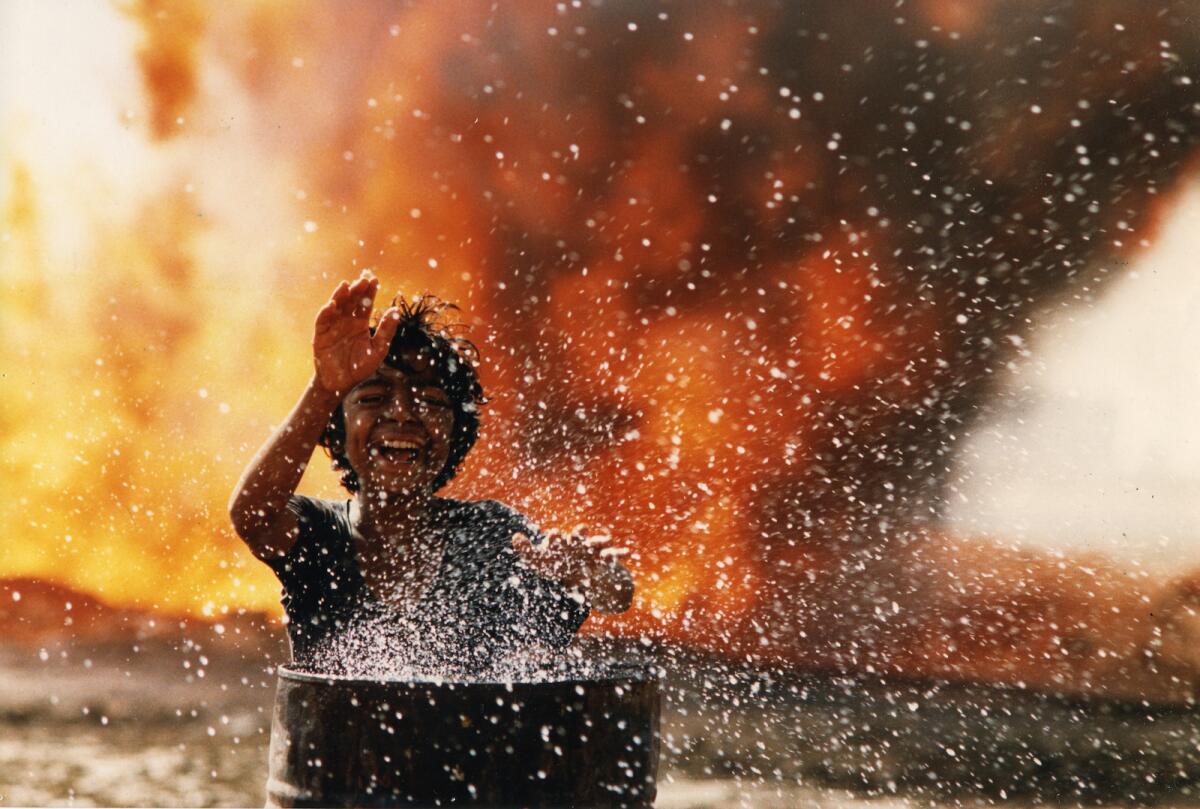Sweetly kinetic and full of life, ‘The Runner’ delivers what we want in a movie

- Share via
Iran-born filmmaker Amir Naderi’s 1984 film “The Runner” is a seminal work from the Iranian New Wave’s post-revolution period. An energetic depiction of a street kid’s constrictions and freedom drawn from Naderi’s own youth, it set the tone for so many Iranian classics centered on children, followed right behind by Abbas Kiarostami’s “Where Is the Friend’s House” and many others (“The White Balloon,” “Children of Heaven”). Now restored to vivid, rollicking life, it’s being released again through Rialto, whose revival of “La Piscine” last year was similarly a back-in-theaters highlight.
In its sun-baked, poetic vignettes of hardship and exuberance, “The Runner” follows Amiro (Madjid Niroumand), a wiry, scrappy boy who lives alone in the upper deck of a beached tanker, scavenging garbage dumps and a well-littered surf for empty bottles to sell. Though illiterate, he still buys aviation magazines, because if he isn’t running races with a pack of boys, or bicycling, or at a chain-link fence watching a plane taking off — so close! — the pictures offer plenty of dream fuel for escape. Gazing at the many cargo ships lining the hazy horizon, he energetically screams for their attention from shore, as if unaware of the potential to feel futility. Again, so close!
For your safety
The Times is committed to reviewing theatrical film releases during the COVID-19 pandemic. Because moviegoing carries risks during this time, we remind readers to follow health and safety guidelines as outlined by the CDC and local health officials.
In fact, Amiro is the kind of urchin survivalist who can make you believe that deliverance through sheer motion — dashing along a beach, chasing down a train — is wholly possible. The movie around him, however, has been made by the adult Amiro, and Naderi is wise about his boldly rendered brushstrokes; “The Runner” is sweetly kinetic, full of life, at times even operatic, but also paradoxically unsentimental. Naderi honors the grit and wits of such kids, but the distance is considerable between Amiro’s life and one that would put him in a biplane for places unknown. (Niroumand, on the other hand, now lives in Southern California and works in education, and has been making appearances with Naderi tied to the rerelease. He may not act anymore, but his boyhood star turn remains an all-timer.)
“The Runner” hardly feels like an artifact, its artistry only burnished over time through Firouz Malekzadeh’s deeply textured cinematography and Bahram Beyzaie’s faultless cutting. But you can see why — in the unblinking honesty descended from Italian neorealism, with its nonprofessional casting and social trenchancy, combined with the personal expression reminiscent of French New Wave — “The Runner” hit international film audiences of the time like a newly discovered color in a spectrum that features Buster Keaton, Vittorio De Sica and François Truffaut.
Also, in the interiority and preoccupations of children, usually in poor conditions, Iranian filmmakers could avoid the political scrutiny that comes with dramatizing adults, while still painting the sorrows, thrills and complexities of living. A child, after all, can at times seem like a peculiar mixture of innocent veteran — since they readily use all they know — and veteran innocent, in that they know they don’t know a lot. The great Iranian directors knew how fertile that glimpse into humanity could be, sparking some of the greatest movies of the last 40 years.
I’d even argue that Naderi’s dynamic, lyrical memory piece has one of cinema’s great action sequences — not usually associated with Iranian films — but it’s not your typical heart-pounder either. The set-up is that Amiro has secured a block of ice necessary to sell ice water from a pail. When two men try to steal it, however, a chase ensues for what seems like miles and miles, our adrenalized, surefooted hero holding an ever-shrinking source of income but also in a bliss of unfettered, self-generated speed. He even stops, hilariously, to taunt his winded pursuer.
When nobody is behind him anymore, Amiro keeps running. What he does at the end will seem nonsensical, but it’s also oddly appropriate for a child’s idea of achievement and joy. Isn’t that the essence of movie action — exhilarating pain and pleasure in the journey, the hustle, that is life? Scratch that. Isn’t that what we want from movies?
'The Runner'
In Farsi with English subtitles
Not rated
Running time: 1 hour, 34 minutes
Playing: Starts Dec. 16, Laemmle Royal, West Los Angeles; Laemmle Town Center, Encino
More to Read
Only good movies
Get the Indie Focus newsletter, Mark Olsen's weekly guide to the world of cinema.
You may occasionally receive promotional content from the Los Angeles Times.








